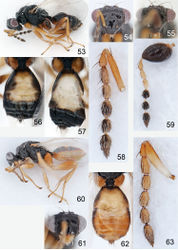Euplectrus insularis
| Notice: | This page is derived from the original publication listed below, whose author(s) should always be credited. Further contributors may edit and improve the content of this page and, consequently, need to be credited as well (see page history). Any assessment of factual correctness requires a careful review of the original article as well as of subsequent contributions.
If you are uncertain whether your planned contribution is correct or not, we suggest that you use the associated discussion page instead of editing the page directly. This page should be cited as follows (rationale):
Citation formats to copy and paste
BibTeX: @article{Hansson2015ZooKeys, RIS/ Endnote: TY - JOUR Wikipedia/ Citizendium: <ref name="Hansson2015ZooKeys">{{Citation See also the citation download page at the journal. |
Ordo: Hymenoptera
Familia: Eulophidae
Genus: Euplectrus
Name
Euplectrus insularis (Howard) – Wikispecies link – Pensoft Profile
- Pachyscapha insularis Howard, 1897: 159. Lectotype ♂ (BMNH), examined.
- Euplectrus insularis (Howard), Peck (1951[1]: 453).
Material
Type material: ♂ lectotype of Pachyscapha insularis (BMNH).
Diagnosis
Very similar to the male of Euplectrus alvarowillei, i.e. with a black and strongly swollen scape (Fig. 59), pedicel and flagellomeres 1–2 yellowish-white and flagellomere 3 dark brown. Differs in having lower face medially reddish-brown (black in Euplectrus alvarowillei); petiole transverse (0.8× as long as wide) (1.0× as long as wide in Euplectrus alvarowillei); hind legs with coxae and femora yellowish-brown (darker in Euplectrus alvarowillei).
Description
Male. Length of body 1.6 mm. Antenna with scape black, strongly swollen, not possible to measure as both scapes have collapsed; pedicel and flagellomeres 1–2 yellowish-white, flagellomere 3 black with peduncle yellowish-white (flagellomeres 4-6 missing). Mandibles and palpi yellowish-brown. Head black and shiny, lower face medially reddish-brown. Vertex smooth and shiny. Occipital margin rounded.
Mesosoma black and shiny. Mesoscutum with sidelobes with several setae. Scutellum convex; 1.1× as long as wide; with very weak reticulation, posterior and lateral margins smooth. Dorsellum along anterior margin with a very narrow groove. Propodeum smooth and shiny; anteromedially with a triangular cup; propodeal callus with seven setae. Legs yellowish-brown.
Gaster with anterior ½ yellowish-white with lateral margins dark brown, posterior ½ dark brown.
Ratios. HE/MS/WM = 1.4/1.3/1.0; POL/OOL/POO = 1.7/1.0/nm; OOL/DO = nm; WE/WF/WH/HH = 1.0/2.8/4.6/3.0; WH/WT = 1.2; PM/ST = nm; TS1/TS2/LT/LT1/LT2/LT3/LT4 = 4.0/2.0/7.2/2.6/1.4/1.0/1.8; LP/WP = 0.8; MM/LG = 1.4.
Female. Unknown.
Hosts and biology
Unknown.
Distribution
The West Indies (Grenada) (Howard 1897[2]).
Remarks
Bouček (1977)[3] synonymized Euplectrus insularis with Euplectrus furnius. Euplectrus insularis is known only from males and Euplectrus furnius only from females. The biology is not known for either species. Until the host is known for either and the sexes can be associated it is best to keep these two species separate. Lectotype specimen of Euplectrus insularis with flagellomeres 4-6 and right fore wing missing.
Taxon Treatment
- Hansson, C; Smith, M; Janzen, D; Hallwachs, W; 2015: Integrative taxonomy of New World Euplectrus Westwood (Hymenoptera, Eulophidae), with focus on 55 new species from Area de Conservación Guanacaste, northwestern Costa Rica ZooKeys, (485): 1-236. doi
Images
|
Other References
- ↑ Peck O (1951) Superfamily Chalcidoidea. In: Muesebeck C Krombein K Townes H (Eds) Hymenoptera of America north of Mexico - synoptic catalog.). Agriculture Monographs. U.S. Department of Agriculture 2: 410–594.
- ↑ Howard L (1897) On the Chalcididae of the Island of Grenada. Journal of the Linnean Society (Zoology) 26: 129–178.
- ↑ Bouček Z (1977) Descriptions of two new species of Neotropical Eulophidae (Hymenoptera) of economic interest, with taxonomic notes on related species and genera. Bulletin of Entomological Research 67(1): 1–15. doi: 10.1017/S0007485300010841
